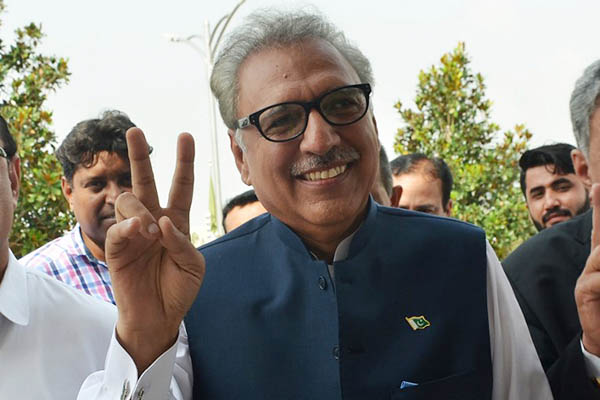
File photo. Farooq Naeem—AFP
Despite rising spread of novel coronavirus in country, government allows congregational prayers with preventative measures
Mosques in Pakistan will continue hosting tarawih prayers during the Islamic holy month of Ramzan, President Arif Alvi announced on Saturday, as he urged people to donate generously to religious organizations so they could meet their expenses.
After presiding over a meeting with ulema in Islamabad, the president said that the government had evolved a 20-point agreement with religious scholars to ensure that preventative measures would be implemented to curb the spread of the novel coronavirus during congregational prayers.
“As part of the virus prevention, carpets will not be laid in mosques,” he said. “For tarawih prayers, people should avoid congregating outside mosques or on footpaths. People should not gather in large numbers outside mosques after prayers,” he added.
“As per the foundations of Islamic society, we as a nation should exhibit discipline, coherence and national uniformity as we continue our battle against the coronavirus,” he said, as he urged religious leaders to ensure adequate social distancing between worshipers in mosques. “The floors of mosques across the country will be cleaned with chlorine to disinfect them. Markers will also be made on the ground for the people to stand when they pray,” he said.
Agreement
- No carpets or dariyaan (mats) to be laid down in mosques because the virus is airborne. Clean floors for prayers must be ensured.
- If people want to bring prayer mats from home they may do so.
- No gatherings after namaz/tarawih will be permitted.
- If a mosque has an open area/garden it is preferable to conduct prayers there.
- People over 50 years of age, children should not be allowed in mosques.
- Everyone must follow instructions of social distancing by WHO and other health experts.
- Tarawih should not be conducted on roads, footpaths and anywhere else than the mosque premises.
- People should continue to observe regular prayers at home.
- Masjid, Imambargah floors should be washed with chlorinated water regularly.
- There should be a six-feet distance during congregational prayers
- The mosque should form committees to ensure that people are abiding by the rules and decided SOPs.
- Markers should be made on the floors of mosques and Imambargahs to guide people about the distance they should keep from others.
- People should do ablution at home.
- People must wear face-masks when coming to mosques and maintain physical distance.
- People must avoid handshakes.
- Itikaf must be observed at home.
- No one must prepare or host Sehri and Iftaar meals in mosques.
- Mosque committees should be in constant contact with the provincial government.
- Mosques committees are allowed to conduct tarawih under these SOPs.
- If during Ramzan, government authorities feel that the situation has got out of control and the number of cases surge, the authorities can review the decisions taken.
The president also appealed to the masses to donate generously during the month of Ramzan, as many madrassas, mosques and welfare organizations await these funds to cover their routine expenses. He said all forms of charity were the right of mosques and madrassas.
